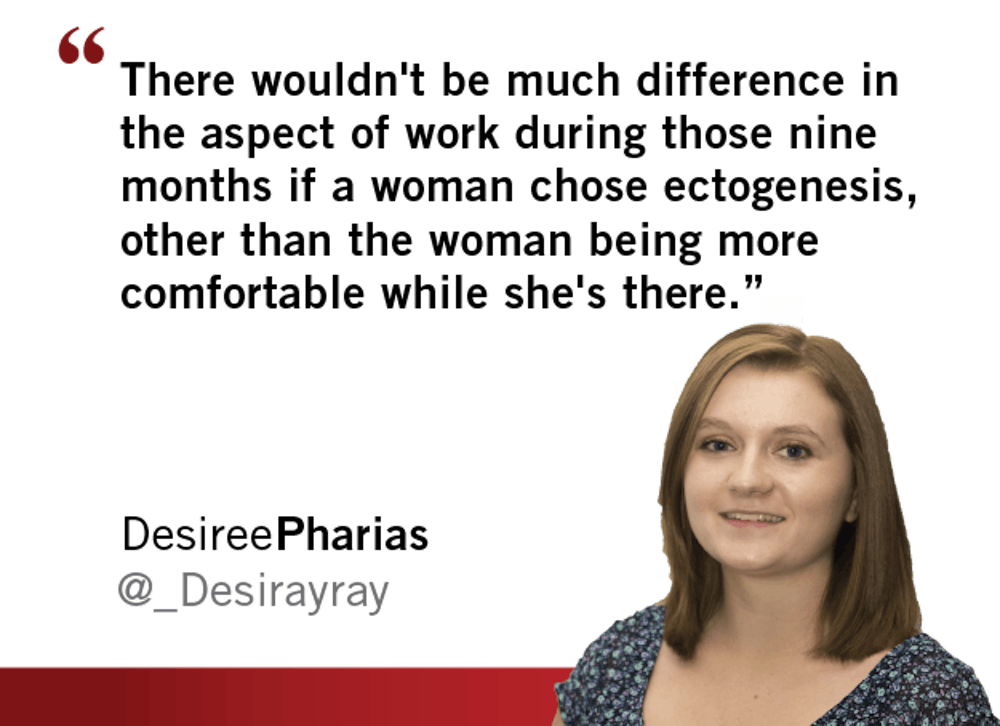The picturesque vision of a mother wearing an apron, watching the kids, as her husband is away at work is undeniably diminishing. Women are taking to the workforce and excelling in their desired professions. However, there has been a lingering debate on whether or not women can “have it all” while being a mother and working a demanding job.
Scientific advancements have been made in hopes of accommodating the fast-paced life of modern-day women, from freezing eggs, and now, to the idea of ectogenesis. Ectogenesis is the process of growing babies in an artificial womb, completely outside of the mother. The idea of receiving a baby from the lab where it grew seems like a completely futuristic concept, but some experts predict it will be here in 20 years. The world of lab-created, genetically modified children that Aldous Huxley invented in “Brave New World” will be here before we know it.
 An article on Slate posited that pregnancy “is also a burden that can make it harder for working mothers to reach the pinnacle of their professions. One way to ease this burden would be to move away from pregnancy as we know it and toward a reliance on artificial wombs.”
An article on Slate posited that pregnancy “is also a burden that can make it harder for working mothers to reach the pinnacle of their professions. One way to ease this burden would be to move away from pregnancy as we know it and toward a reliance on artificial wombs.”
It misses the point. Artificial wombs, however, would not suddenly make it easier for women to “reach the pinnacle of their professions.” Sure, this advancement would make it so the woman wouldn’t have to physically carry her baby for nine months, but even when one is pregnant, she still has to go to work.
There wouldn't be much difference in the aspect of work during those nine months if a woman chose ectogenesis, other than the woman being more comfortable while she's there.
Whether grown in a lab or not, there is still going to be a new bundle of joy that will have to taken care of at the end of the nine-month period. You’re still going to have a newborn baby to tend to, and you’re going to want to be at home with it for a while. So, will maternity leave diminish as artificial wombs come into practice? Probably not. Yet again, what benefit does this have for your job?
For the next 18 years, the woman will still have a child, even though she didn't house it in her very own uterus. That, in theory, will still take away from her job. It seems as if the so called “burden” of having a job and a child will not suddenly be elevated by artificial wombs.
However, the non-scientific solution to this issue seems a lot more plausible. Men have gone away to work their fast-paced careers for years, and no one seems to question their ability as a father. Why should motherhood be any different? Both parents can have demanding jobs as long as they are both equally caring for their child. Being a “good parent” doesn't necessarily mean you have to stay at home. Being a parent could simply mean listening to your child tell a story about their day, or reading them a bedtime story once you are home from work.
Not only that, it has been shown that having a mother within the workforce can actually benefit children. Growing up and seeing your mother and your father working hard will in some cases inspire the children to follow in their footsteps. Parents who work as well remain there for their children as a constant outlet of support? Even more inspirational.
Artificial wombs aren’t the automatic solution to the life of the fast-paced modern woman who also wants to be a mother. It actually does very little to benefit their career. Just like a man can go to work, come home and still be considered a father who is present in his child’s life, a mother can do the very same thing. A woman with a successful career shouldn't have to be separate from a woman with a child. Given the right circumstances, we can mesh these two ideas easily, without having to grow our children in labs.
Reach the columnist at dpharias@asu.edu or follow her on Twitter @_Desirayray
Editor’s note: The opinions presented in this column are the author’s and do not imply any endorsement from The State Press or its editors.
Want to join the conversation? Send an email to opiniondesk.statepress@gmail.com. Keep letters under 300 words and be sure to include your university affiliation. Anonymity will not be granted.
Like The State Press on Facebook and follow @statepress on Twitter.




